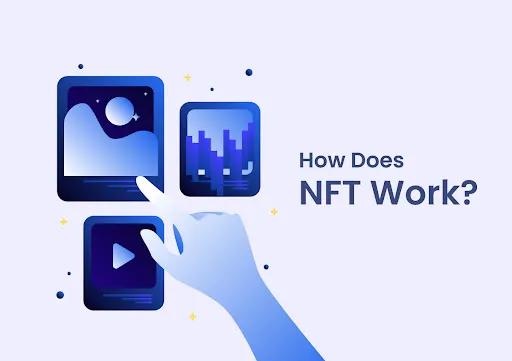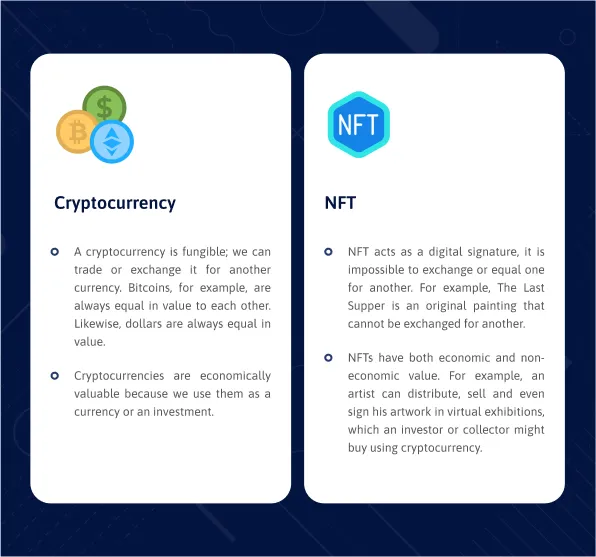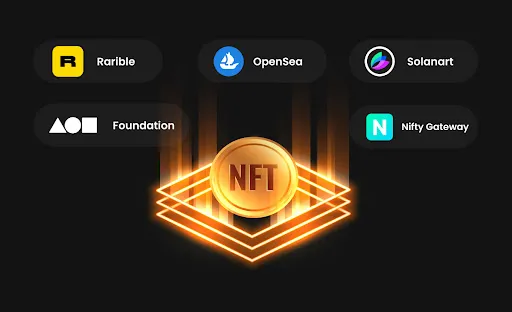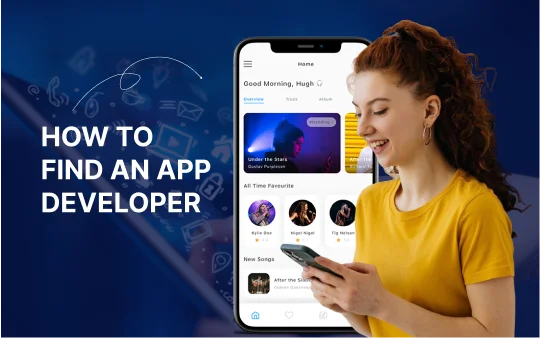NFTs are digital assets stored on a blockchain, include various forms of digital content, and may even be attached to physical assets. A blockchain records ownership of these assets, making them suitable for trading and sale.
As bitcoin makes the digital answer to currency, NFTs are now being pitched as the digital answer to collectibles changing the lives of digital artists. This article will let you understand what NFT is, how to create an NFT, NFT marketplace, and what makes them unique with the top NFT developers. Let’s dive in to understand!
If you want to read about blockchain in detail, read here:
What Is NFT?
Now, people can create their goods and sell them on the internet using a new category of digital collectibles. These goods are often called NFTs, which stand for non-fungible tokens. NFT has many types, like digital collectibles, domain names, games, essays, and sneakers in fashion. This blog will explore how NFT is used in various industries and how it can be used in different markets.
As they are non-fungible, NFTs are unreplaceable, interchangeable, or tradeable, like Bitcoin and Ethereum. Currency and cryptocurrencies are fungible, meaning they can be traded or exchanged.
- NFT stands for a non-fungible token, which means nothing can replace them because they are one of a kind
- NFT is a blockchain-based technology that uses tokens to represent items, such as art pieces or virtual goods
- NFT cannot be forged or otherwise manipulated
- NFT exchanges take place with cryptocurrencies such as Bitcoin on specialist sites
How Does NFT Work?
NFT Development companies create customized blockchain solutions for enterprises on Ethereum networks to develop the most decentralized and scalable platform with maximized performance and security.
- NFTs are mostly stored on Ethereum’s blockchain, a distributed public ledger that records transactions.
- NFTs store digital data with some value inside.
- Just like other physical types of art, their value is determined primarily by the market and demand.
- One of the major benefits of a non-fungible token (NFT) is the uniqueness of the token, which allows for easy verification and validation.
Unleash the power of NFTs with custom solutions from ValueCoders, the premier NFT development company crafting unique and secure NFT experiences.
What Is NFT Used For?
We use NFTs for various purposes, including digital content, gaming items, investment, and collaterals. We have mentioned some uses of NFT here:
Digital Content
The largest use of non-fungible tokens (NFTs) today is in digital content. Creators can monetize digital content via NFTs without interference from third parties, such as middleman sites, benefitting creators by ensuring that their revenue isn’t shared.
Online Gaming
NFT creates great interest for game developers as it offers players many benefits. If you buy items for your character in an online game, that’s about it; however, with NFTs, you can sell them once you’re done with them to get your money back.
Investments and Collaterals
DeFi applications enable you to borrow money using collateral. They use the same infrastructure as NFT. DeFi and NFT collaborate to explore using NFTs as collateral instead.
Domain Names
NFTs help you own a better domain name, like a website, which is much easier to remember. These are easier to buy and will make customers more confident in their purchase.
Ensures Authenticity
NFTs ensure that products you purchase are genuine, as blockchain permanently stores information about the product. NFTs can store information about the manufacturing process, ensuring everything is fair trade. In industrial design prototyping, NFTs have already proven successful in numerous companies.
Real Estate
In the real estate industry, NFTs can transfer land deeds, provide proof of ownership, and even track changes in property value over time.
Maintaining Medical Records
NFT ledgers protect individuals’ medical records without jeopardizing privacy or exposing them to manipulation.
Have a look at the places where most NFT users live with these stats.
Also Read: Cloud Computing vs. Blockchain Technology: Which Is Right For Your Business?
Why Are NFTs Becoming Popular?
Since 2015, NFTs have been around, but they are now getting more popular due to several factors. First, and most obviously, is the normalization and excitement surrounding cryptocurrencies. Fans, royalty economics, and the laws of scarcity are beyond the technology itself. Consumers want to own unique digital content and hold it as an investment. The stats show the number of unique NFT wallets from 2017 to 2021.
Non-fungible token purchasers gain ownership of the content but can still distribute it online. That’s how NFTs gain popularity – the more they’re used online, the more valuable they become. With the original creator receiving 10 percent of the sale, the platform gets a small percentage, and the current owner gets the rest. As popular digital assets are purchased and sold, there is a potential for ongoing revenue.
Authenticity is the key with NFTs. Thanks to the blockchain, digital collectibles are distinguishable from each other and are easily verifiable. Fake collectibles cannot be created or circulated because they can be traced back to the original creator, unlike cryptocurrencies (like baseball cards in real life).
NFT & Crypto: What’s The Difference
Cryptocurrencies and NFTs are different. Cryptocurrencies are digital currencies used to trade NFTs. Unlike the US dollar, cryptocurrency’s value depends on its utility, just like NFTs. Investors, collectors, and rarity affect the value of NFTs, which can represent anything, including artwork and video games.
Find out a few more differences between NFT and cryptocurrency here:
How To Create An NFT?
Non-fungible tokens (NFTs) are typically attached to digital art. The idea is to create a one-of-a-kind digital artifact that can be bought and sold, like a painting from an art gallery. It could be an image, an audio production (a song), or even a short video clip (an animated GIF).
NFT Development Companies in India are also trying their hands at creating different NFTs.
Figure Out What You Want To Create
NFTs have unique qualities found nowhere else or owned by someone else. You must own the rights to digital media to avoid the chance of violating any laws.
Choose A Blockchain
Choose the right blockchain to fit your needs, as it will keep a permanent record of your NFT.
Ethereum
One of the most popular public blockchains with NFTs is Ethereum. Many non-fungible token (NFT) marketplaces can create NFTs based on the Ethereum blockchain, though trading NFTs on the Ethereum blockchain often comes with hefty transaction fees.
Solana
The closest alternative to Ethereum’s blockchain is Solana, designed to be a faster, cheaper alternative to Ethereum, charging less than $0.01 for every transaction and a growing list of supported apps for non-fungible tokens. Solana differs from Ethereum as it uses proof-of-history (PoH) and proof-of-stake (PoS) consensus mechanisms, allowing faster transactions.
Set Up An NFT Wallet
To store your crypto token or NFT, you must have a crypto wallet that supports the specific blockchain you choose. Download the crypto wallet app, and set up your private key and recovery phrase. Also, keep a digital copy of your private keys and recovery phrase in a secure place offline.
Some popular crypto wallets that support multiple blockchains are:
MetaMask – It is a popular crypto wallet that supports numerous cryptocurrencies, including Ethereum and Solana.
Coinbase – It’s another popular wallet that can be downloaded as a mobile app and supports multiple cryptocurrencies, including Solana.
Ledger Nano X – It is a hardware wallet supporting Ethereum and Solana.
Choose An NFT Platform
Wisely choose NFT platforms, many of them offer a wide range of features, but the best ones provide a full-service marketplace for listing and selling NFTs. We’ve listed a few of the most popular ones below.
OpenSea – It is the most popular Ethereum-based NFT platform, with more than $20 billion worth of trading volume. It lists over 2 million NFT collections, making it the most popular Ethereum-based NFT platform. The platform also supports Solana NFTs.
Solanart – Featuring some of the most popular Solana NFTs on its platform, Solanart provides a sleek user interface and an easy process for new token issuers to publish their creations.
Cryptoexchanges – Several crypto exchanges support NFT creation, including Binance Exchange.
Unleash the power of NFTs with custom solutions from ValueCoders, the premier NFT development company crafting unique and secure NFT experiences.
Create an NFT
Creating an NFT on OpenSea is straightforward once you have chosen your platform. Here are the steps:
- Connect your wallet – Connect your wallet by selecting the wallet icon on the OpenSea menu. To proceed, you will need to sign a verification on the wallet app.
- Click On Create – It presents a selection menu for the NFT creation process, including the upload, NFT features, properties, and blockchain.
- Upload your media file – Upload the photo of what you’ll be selling. You can upload directly or generate a link to an external file.
- Enter the details – Name your NFT and describe it. You can add unique properties and other perks, such as access to a private Discord channel or merchandise discount codes. Limiting the number of coins made (usually just one, unless you make a full collection) is also possible.
- Select your Blockchain – Your NFT will reside on this blockchain, which cannot change once minted.
- Create the NFT – You can easily create your NFT by selecting “Create” once you have filled in the details. You will see the file upload and the NFT created, but you have not yet listed it for sale, and you can still change the metadata until you list the item.
If you want to create a customized NFT, there could be nothing better than hiring NFT developers. NFT developers are aware of every detail that needs to be taken care of while creating an NFT.
Also Read: Why Should Enterprises Adopt Blockchain For Digital Assets?
Why Do People Buy NFTs?
NFTs are used to create digital collectibles. For instance, Jack Dorsey recently made his first-ever tweet a non-fungible token. Last year, the New York Stock Exchange also announced they would hand out digital tokens representing the first trade of certain companies besides a few important digital mementos.
Unlike JPEGs, we cannot reproduce NFTs for an unlimited time, which helps render original digital artwork, rare collectibles, or game assets. If you take a screenshot of a picture from a website, you are not the owner of that image, but the technology will allow you to own digital property for the first time.
Have a look at the value of the most expensive NFT to date.
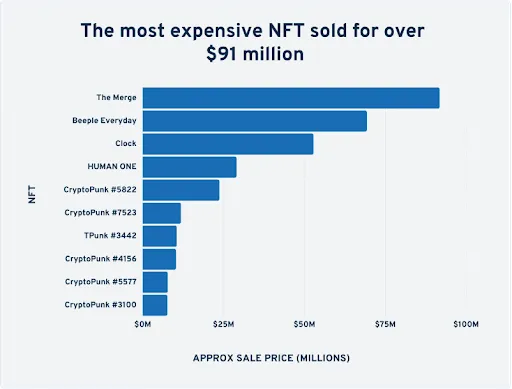
Let’s look at the pros and cons of NFTs mentioned by the experts of NFT development services to understand whether you should buy NFTs.
Pros of NFT
Exclusive Benefits – The major benefit of non-fungible tokens is that they offer owners exclusivity in the digital asset space. It means that owners can own something that isn’t accessible to anybody and use this to receive perks such as special access to forums and early access to upcoming non-fungible token collections.
Creating Investment – NFTs are investments because they cannot be divided, and each NFT can be more valuable than any other cryptocurrency. Their value is determined by demand and how much someone will pay for them, making them a desirable investment. NFTs may be seen as a digital store of wealth due to their ability to preserve value and resist inflation while providing a stable investment option.
Secured Digital Ownership – NFTs are used to verify digital ownership. Each one is tracked and verified on a decentralized blockchain, making it practically impossible to fake or steal. Because of this, they’re ideal for safeguarding digital rights, especially for physical assets like real estate.
Decentralization – There is not any central authority to control NFT trading and selling. The advantage of this is that it removes the need for a mediating party. Instead, each member of the blockchain network receives the same immutable data.
Expansion Of Network – The makers of NFTs offer incentives like passes to exclusive events, memberships in clubs and groups, and rewards for purchases of NFTs to encourage the trading of NFTs on the platform.
Artists Advocacy – Through NFTs, artists can protect their creations from exploitation by connecting directly with sellers and investors instead of working with third-party companies that often siphon earnings.
Unleash the power of NFTs with custom solutions from ValueCoders, the premier NFT development company crafting unique and secure NFT experiences.
Cons Of NFT
Environmental Impact – NFT can be traded with major cryptocurrencies such as Bitcoin and Ether. These cryptocurrencies use a protocol called Proof of Work. It is like a mathematical puzzle that proves that a certain amount of computational power has been spent, thus confirming the validity of a blockchain transaction, calling the process cryptocurrency mining.
As the networks grow, the puzzles become more difficult, so the computational power required for solving the puzzle grows. According to some environmental activists and financial regulators, the energy it takes to maintain this digital economy is not sustainable.
Community Impact – Energy is expensive, causing mining operations to migrate to areas where energy is cheaper, leading to higher energy prices in nearby areas and driving cities to consume more of their hydropower quota. Hardware-intensive operations can make the ground vibrate around the operations area.
How Many People Are Buying NFTs?
The total transactions for Non-Fungible Tokens reached $10.7 billion worldwide for the final quarter of 2021. The interest in this investment strategy spans more than the domain of professional investors.
According to Morning Consultant’s survey, 23% of Millennials in the US collect NFTs as an investment or a hobby, while one-third of American adults collect them in a similar way.
An independent Finder poll found that respondents from the 20 countries in which they conducted their survey expressed the most interest in adopting non-fungible tokens from the 28,000 who took part in their study.
CivicScience research reveals that people earning less than $25,000 annually invest in NFTs similarly to those earning more than $150,000.
Also Read: How Has Blockchain Evolved FinTech?
How To Buy NFTs?
NFT transactions generally occur in a dedicated marketplace. Go through this step-by-step guide mentioning the process of buying these digital assets.
- For most marketplaces, the Ethereum network powers their transactions, so to buy an NFT, you’ll need Ethereum’s native token, Ether. A WazirX or Binance account is also a good place to buy the tokens.
- Ethereum users need to create a crypto wallet compatible with the system. A crypto wallet is a digital address that you can use to store cryptocurrencies. Platforms such as Metamask, Binance, or Coindesk allow you to open wallets, but you need to register on the platform of your choice.
- To use the wallet, you need to send the ether you purchased from the exchange to its address after you’ve opened it.
- You can decide which marketplace to buy the NFT from. There are multiple marketplaces for NFTs. Some of the most popular markets to buy Non-Fungible Tokens are OpenSea, Rarible, SuperRare, and Foundation.
- You will need to register with the marketplace of your choice. Each marketplace has its registration process.
- Hook your wallet up to the marketplace. Most marketplaces have a ‘Connect wallet’ option on the site.
- Check out the marketplace, find an NFT you want, and start an auction for it. Most marketplaces have a bidding system to help you out. You will need to bid for the item you are looking for.
- After a successful bid, you’ll complete the purchase, and the appropriate amount will be deducted from your account. You might also be subject to a transaction fee by the marketplace depending on where the sale occurs, but remember that there are various markets you can use.
Some Popular NFT Marketplaces For Your Reference
An advantage to Hire NFT Developers is that they can make you aware of the latest and most suitable NFT platforms as per your requirement, making it the best way to select an NFT marketplace development company.
However, for your convenience, we have mentioned a few NFT marketplaces here, recommended by the top NFT development services.
Rarible – Rarible is a decentralized marketplace that permits artists and creators to launch and market NFTs. Holders can vote on key aspects, such as prices and community rules.
OpenSea – The first thing you need to do to get started is to create an account on the official website of OpenSea, which offers lots of items from rare digital collectors and more conventional ones.
Foundation – In this community, artists must receive an invitation from another artist to post their art, and the exclusivity assures a higher-caliber artwork, assuming that NFTs are going to be in high demand in the future.
Conclusion
NFT is still a young and volatile technology, and there is no doubt that a tremendous change is coming down the road. They have gained such popularity in such a short period that there is no doubt they are here to stay.
NFTs will likely continue to expand and evolve in their applications to reach the needs of everyday individuals as they go about their daily lives. With NFTs, services become easier to use, and transactions become more transparent, especially for tangible assets like real estate, artwork, ideas, concepts, etc.
NFT Development Companies will bring more advancements in this area in the coming years at a rate that will transform everyday life for the average person.

